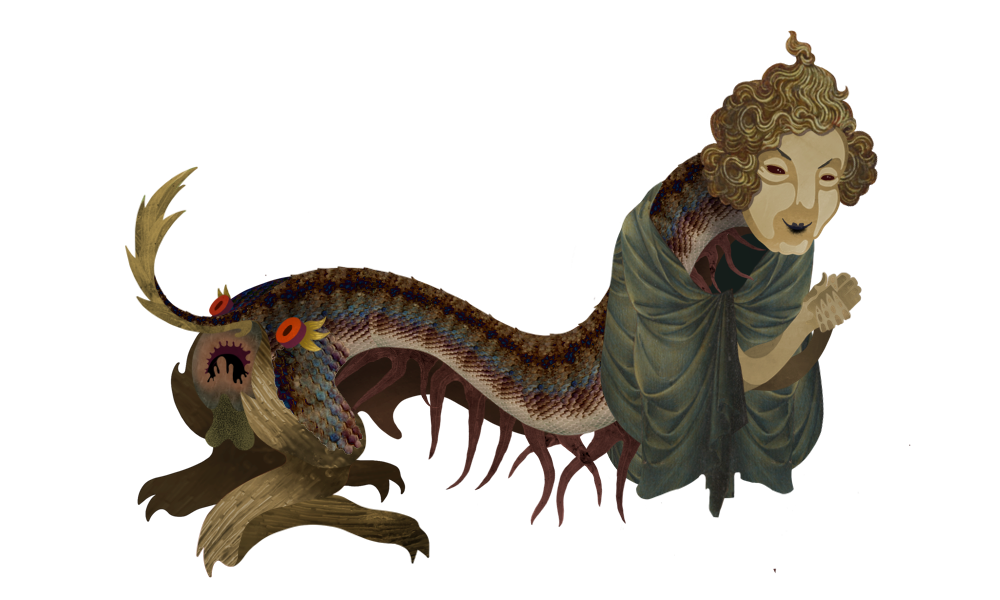A Taxonomy of Hate
Spiritual Self-Defense Curriculum

The left provokes the right into acting out its own repressed impulses: that's a powerful formula, which is much older than "left and right" - most likely it is as old as "good and evil". What was it Zoroaster had his righteous god say to his evil twin?
Neither our thoughts, nor commands, nor our understandings, nor our beliefs, nor our deeds, nor our consciences, nor our souls, are one.
Zend Avesta, Yasna 45.2
There is a qualitative difference between the blustering explosive hatred of the right and the seeping vitriol of the left. When a political conservative gives himself over to hate, he is looking for a reprieve from his self-loathing: there is a wishful and projective quality to rightwing hate - it generally remains superficial, mere Ersatz, and "as if". He hates because it dispels the fog of his chronic confusion and sense of having been left behind: with a projective hate he finally knows who he is and what he wants. A white supremacist seeks shelter in his race hatred from his own lack of stable identity; a misogynist seeks elusive self-esteem from a disrespect of women; the ignorant man who boasts of his hatred for Mexican Americans will later mingle with them thoughtlessly and forget his slurs.
With the left, I find another order of animosity entirely - something both more archaic and perhaps more profoundly determinative of the human future: the seething hatred so characteristic of those who learn to turn weak social positions into strategic advantage, the boiling resentment of the avaricious yet mediocre, the accumulated frustration of civilization itself. I find something much more chilling and dangerous in the unconscious tactical malice of the "progressive": a much deeper thirst for violence lies hidden there, a thirst for police action, a thirst for anonymous atrocity, and the cleverness to carry it out with a good conscience. It is the good conscience of the progressive that is so dangerous: compared to the redfaced sputtering rightwing, who seem to act only by accepting their positions with a bad conscience, the left is many times more skilled in the fabrication of moral justification, moral disguise, moral right... The leftists are the artists of conscience and the conjurers of plausible deniability: it turns out that a life lived continually offloading frustration with the means available to the pointlessly educated, half-therapized, and sedentary urban bourgeoisie, results in an animal highly practiced in inventing reasons why they are never to blame, never responsible, and always already in the possession of a moral high ground. In urban modernity, any other tactic results in untenable guilt, paralytic anxiety, and crushing depression: from this perspective we almost begin sympathizing...
And perhaps we should in this case stand an unrelenting analysis of the truth, between our revulsion at the aesthetic totality of this vicious creature on one hand, and whatever fragment of compassion we are capable of on the other: because have we not also been this creature at one time? All of modern humanity is bound up in this tangle, for as long we continue to reinvest in the contortions of realized modernity. From this perspective the conservative convulsions are merely hiccups and belches and an attempt to flee.
In every distasteful compromise, in every calculating cowardice, in every moment of instinctual repression for the sake of safety and surety there is the potential for becoming more wretched - that is more "progressive": the moment we learn to make an enemy of our aggression and an ally of our ideological fantasies, is the moment we become more suitable for the world we have been crafting since 10,000 BC.
The political left is bleeding out its talented tenth, alienating its brightest youth, and forcing them into a no man's land where they stand much too nauseated to ever look left again, and yet still looking askance at the right and feeling more unwilling to offer uncritical loyalty to anyone than ever before - and yet we also feel that coherent political positions are more necessary than ever before: finally in our generation "rights" seem to mean something more than moral posturing, the facility of the U.S. constitution to prevent despotism suddenly means something, and what seems urgent is a renewed and genuine investigation into "the concept of the political"...
Progressive politics encourages and deepens the castration of instinctual life, replacing the rewards of family and tradition with the more volatile and dissipative gratifications of moral posturing and vicarious victimhood. This has the effect of accelerating the accumulation of repressed aggression - which is again what I see as ultimately determinative. In fact I'd say that progressive politics has the curious effect of simultaneously permitting egregious aggression while encouraging an atmosphere of ubiquitous frustration, as though no one were ever getting what they want despite incessant gratification.
When leftist thinking goes sour, when moral posturing and neutralized virtual rebellion no longer dissipate frustration fast enough, the system is pushed into a higher order parameter I term "ritual exclusion": a species of protofascism arises which we must learn to recognize. The big question: is this emergent fascism the inevitable logical conclusion of the liberal tradition, or only its degenerative offal? Yet as a psychologist, rather than analyze the problem from ideological grounds as everyone else does, I naturally gravitate towards what I consider ultimately determinative: the immediate and hidden psychology of political antagonism, or what I'd like to call the taxonomy of hate...
I see so many of my potential brothers and sisters warding off the perceived danger of an uncompromising misanthropy, with the solace of an imitative ethic of compassion. It may sooth your ragged soul, you may feel gloatingly superior for a moment, it may appear to be a prettier feeling than honest hate, and most importantly it may feel sufficiently cruel so as to sate your wrath - at least in twisting yourself up into a compassionate stance you have found an object for your violence - but it is not only a deferral and a detour, it is a quagmire from which you may never emerge again. Your praxis of compassion will gradually shape you into a loathsome hypocrite: you will eventually become what you initially hated. Honest, responsible, good-natured hatred is beautiful and true - not merely necessary, not merely "Machiavellian", nor "Darwinian", nor anything to be taken lightly. Is the strength and power of the healthy human body somehow ugly? Is the history of the most successful predator of the last 100,000 years a "rightwing" story and thus a projection of self-loathing? Or is wrath one of the gods? Does Ares deserve Aphrodite, or should she belong to the resentful clever cripple? Sword or snare? The burning glance of contempt or the slow creeping revenge of the sanctimonious liar?
In modernity, summoning the permission to hate requires more integrity of self than the majority are capable of: the result is that one either foreswears hatred while practicing its darker arts unconsciously - leftwing; or one merely imitates attitudes of honest hatred while unconsciously projecting a self-loathing - rightwing.
The ground I'm treading here is dangerous: this is why no one with half a brain comes here. I'm well aware that I'm supposed to avoid it, that meditating atop a corpse whilst smeared in charnel ashes isn't considered kosher anymore... But hatred is not "goth", nor macabre, nor "maya": hostility is a living function of every organism. The suppression of hate is also the suppression of love: only when one does not know who one is and what one wants, is "universal love" possible - which I translate as "universal resentment". I find no one so incapable of sincere affection, as those who preach the elimination of hate.
All the most intelligent are too clever to tell the truth about aggression, hostility, and hate: they provoke the stupid laggards to say the obvious, so that they may claim the message is only motivated by stupidity and ignorance - all the while covertly gloating and dwelling upon every delicious detail. This is why someone like myself can seem so unusual: someone apparently stupid enough to say the forbidden and obvious, but smart enough to say it too well to ignore. I allow myself to be trapped, so that I may practice escaping.
In fact my work would probably stand a much better chance of "going viral", if I were less eager to demonstrate freedom of mind... I'm well aware that the sheen of erudition and poise repels the rightwing audience as much as my content turns away the left: the reactive crowd has learned to equate ugliness with truth and mistrusts anything else, while the politically correct have learned to equate cosmopolitan polish with an unassailable moral high ground and thirst for nothing else.
What should you hate? What is inimical to you. What weakens you, what hinders your growth, what you want less of in your world. Why are these words so dangerous? Because we are surrounded by neurotic, tribeless, desperate masses who despise themselves and therefore seek to project this loathsomeness into the nearest available target: hate is easily slandered in modernity, because almost no one is healthy enough to do anything but project self-loathing.
The most circumspect sense of responsibility is therefore required, in claiming the right to hatred with a good conscience. I would not advise this "Left Hand Path" to anyone who has not already passed through several incarnations of self-torture: the analysand, the meditation practitioner, the humanitarian, the compassionate one. Strangely enough, this is one of the few points at which I will advise the praxis of compassion: in selecting worthy enemies, in guiding one's hatred, in becoming qualified to know what you're aiming at. There are some of my readers who may sympathize with my work enough, to find traces of my own compulsive compassion everywhere in my psychology: but compulsive compassion is something one should be ashamed of, and seek to correct as a character flaw...
We freely hate spirits, ages, movements, ideologies, habits, traits, errors: one of the refinements along this path, is to understand how in any one personality, are to be found a loose combative parliament of contraries. Yet it's suspicious to say, "You are permitted to hate abstract entities, but never a real person." My first response is that a "person" does not really exist either: there are human bodies, human groups, and human feelings, but "person" is merely another word for "mask" - look it up.
Secondly, there are such "persons" so infected with a particular spirit, who so thoroughly embody an error of human maladaptation, that it becomes absurd not to hate. Yet I am also fully aware, perhaps more than I care to elaborate upon, how possible it is to find the redeemable in anyone: this is the point where you have to examine whether it isn't actually your grotesque grandiosity that makes you feel convinced that your petty little hostility is so dangerous and that your petty little theater of compassion might save the world. "My compassion for all sentient beings": I've heard this phrase verbatim from some of the most repulsive little bigots one can find in our world.
Finding our way back to a healthy, unashamed, mirthful laughing hostility: the phrase "fuck off" contains a dose of this health, doesn't it? It says, "You're not my responsibility and my hostility to you is therefore none of your business." I used to live in a small town of southern Germany, where the typical German bureaucratic pettiness was played out in such funny little rituals as their obscure rules about parking spaces and precise time allotments - I chose not to drive rather than deal with it: but I once was able to witness a delightful contrast, when such a pedantic German accosted what he assumed was a countryman with the usual "Schimpfkanonade" of scowling reproach concerning some breach of conduct - only to find out that this was actually an Italian couple, who thereafter offloaded upon this speechless man a bewildering torrent of Mediterranean hyperbole and wonderfully insulting gestures, who demonstrated for all the town the virtues of unashamed healthy hostility. "Vaffanculo" is how they say it in the sunny Italian hills, with that amazingly obscene flick of the wrist under the chin - and it's said so often that even this contraction is contracted further to just "vaffa"... If this doesn't make you smile and feel that life after all is worth living, and that humanity is after all not so bad - then I cannot help you.
Profanity is a deep and subtle art: one should probably undertake the earnest study of the Mediterranean forms of swearing in order to develop a lasting relish. It's not unlike winetasting: every curse has its own terroir. Even a single word like "shit" has at least seven discernible senses. Yet as an American I'm always turning back to the indomitable f-bomb. Take the example of "fucking A" - one of my personal favorites but not something I can precisely explain: some say it's a piece of GI slang, for "fucking affirmative". Perhaps that's why I love it: it says, "my hostility and my affirmation can live as one".
"Vaffanculo" is a bold suggestion about which orifice to employ in intercourse: a common model for many of the most delightful insults - although also casting doubt upon your adversary's paternity or his mother's occupation is a common strategy. "Go fuck yourself", "sit and spin", or one of my favorites, "jump up my butt": what do these have in common? The asshole as primary locus of devaluation: shit comes out of it and the penis isn't supposed to go in it. But it's well known that children often consider their fecal matter a precious resource, going so far as to retain it and "lord over" it: I know one case of a bright little girl, who liked to stand over the toilet bowl and pretend to sell the recently deposited product to her loyal customers like a proud proprietor of a fine delicatessen. Shit as primordial ambivalent object: valuation and devaluation come from the same place, namely proximity to the optimal functioning of the body. The act of excretion is the template of devaluation, while the result of excretion also represents the healthy functioning and an artifact of that same body: what we deign to hate, is often something we have already honored. We eat our enemies: if you haven't digested him, you won't know him well enough to fight him. Thus the choice of enemy should be taken seriously, as long as you also take your honor seriously.
What I've just said also helps reveal the intimate relationship between projection and hate: this is the point where contemporary psychology becomes most dangerous to human health, because it teaches that all hostility is projection. Any behavior but domestic apathy and moral posturing is increasingly considered pathological: you are supposed to either channel your aggression into sanctioned rituals of anonymous mass violence, or repress it until it eats you alive, or act out explosively and become a target of moral outrage. Passive aggressive complicity as a prancing bambino of political correctness, or depressive melodramatic self-destruction, or ineffectual domestic terrorism: those are the options available on this limited menu.
There is a convention in late medieval and baroque art, in which demons are depicted with a second face centered on the anus. Pieter Bruegel and Hieronymus Bosch elaborated upon this convention more than anyone else, and Bosch in particular seemed to understand its potential to express the consequences of repression: look how many of his priestly figures have the faces of pigs, how many of his sinners are folded up into an ouroboros of mouth to butt...
The asshole is another mouth, the butt is another face, the "evil" is another "good": it's actually common knowledge, as soon as one consults the context of the juvenile romantic novel, that "repressing a feeling only makes it stronger" - yet this common sense mysteriously disappears in the context of "negative" affect... Do not be deceived: no one is actually this stupid, but rather most are clever enough to ignore the second face - or rather keep a close eye on it, but never speak of it.
... daß die Verdrängung die Triebrepräsentanz nicht daran hindert, im Unbewußten fortzubestehen, sich weiter zu organisieren, Abkömmlinge zu bilden und Verbindungen anzuknüpfen. Die Verdrängung stört wirklich nur die Beziehung zu einem psychischen System, dem des Bewußten. [...] Sie wuchert dann sozusagen im Dunkeln und findet extreme Ausdrucksformen, welche, wenn sie dem Neurotiker übersetzt und vorgehalten werden, ihm nicht nur fremd erscheinen müssen, sondern ihn auch durch die Vorspiegelung einer außerordentlichen und gefährlichen Triebstärke schrecken.
... that repression does not hinder the instinctual representative from continuing to exist in the unconscious, from organizing itself further, putting out derivatives and establishing connections. Repression in fact interferes only with the relation of the instinctual representative to one psychical system, namely, to that of the conscious. [...] It proliferates in the dark, as it were, and takes on extreme forms of expression, which when they are translated and presented to the neurotic are not only bound to seem alien to him, but frighten him by giving him the picture of an extraordinary and dangerous strength of instinct.
Freud, Die Verdrängung, §I
Repressed content not only seeks expression via alternate channels - "acting out", hysteria, projection - it seeks coherence. This is the meaning of la condition seconde, the "split personality": given enough time and thoroughgoing repression, eventually what is repressed becomes another person. Everything in the psyche eventually organizes itself into a "persona", and because the prime coherence in primates is the face, it's inevitable to see another face in that locale of repression... In fact, one of the more subtle arts in reading the human creature, is the ability to glimpse this second face between the practiced grimaces and obsequious smiles: like stargazing, you must use "averted vision" and a peripheral attack. If you can catch the subject before he knows he's being witnessed, he will sometimes show you this face: it's the face he wears when he talks to himself.

In Michael Pacher's 15th century rendition of Saint Augustine making his tricky deal with the devil, notice how the devil's primary face is partly obscured, so that we're left with the face of the saint and the assface of the devil: they are one spectrum, one analyzed rainbow of repression, in which the most honest face is the central face of the devil who is being tricked - a demon is by definition a canalization of blame, a leverage splitting good and evil. This is where we will end up: may we become ever sharper axeheads which split good and evil down to the roots where they join, where we may finally feel at home.
In discussing the uncanny, I have mentioned previously that Freud found that negation as such does not exist for dream formation. The most precise way of saying this, is that every valuation implies the whole dimensional predicate - ambivalence is the only stable signifying locus. But in dreams, there does seem to be an exceptional clause:
In my view the contemptuous critical judgement, "it's only a dream", appears in a dream when the censorship, which is never quite asleep, feels that it has been taken unawares by a dream which has already been allowed through. It is too late to suppress it, and accordingly the censorship uses these words to meet the anxiety or the distressing feeling aroused by it. The phrase is an example of esprit d'escalier on the part of the psychical censorship.
To include something in a "dream within a dream" is thus equivalent to wishing that the thing described as a dream had never happened. In other words, if a particular event is inserted into a dream as a dream by the dream-work itself, this implies the most decided confirmation of the reality of the event - the strongest affirmation of it.
Die Traumdeutung, VI.i and VI.c

In so many of the medieval and baroque depictions of demons, the primary face remains a little unconvincing: it's often simply bestial and wild, as the demons surrounding Saint Anthony in Martin Schongauer's engraving. It's only when they give themselves permission to draw the assface, that something really hideous and uncanny appears. The demon's butthole is doubly negated - "it's only a dream"... This is something like how I feel about Donald Trump: he's not merely "rightwing", he's an absurd caricature of the right, such that he expresses the repressed content of the left. It was the left's obsession with this caricature, this bleary carnival afterimage of themselves, which elected him. As I said already:
This "president" came on the stage like an obvious and unfunny clown in the midst of a tedious drama somehow taking itself seriously - something like a very bad comedian showing up in the middle of a particularly insufferable piece of modern dance: a relief to everyone, whether they'll admit it or not.
The Moral Disease, §374
The question becomes, whether there is any such thing as healthy hostility that is not a function of neurotic projection: but this is only treated as a serious question within the palace of absurdity that is human political posturing - ethologists do not wonder whether a predator is neurotic because it hunts. Obviously everyone already knows the answer: political correctness assumes as its self-evident right, the right to collectively justified violence. One must not be taken in by this pretense of ignorance and inquiry: it is only a hedging of bets, a cultivation of an aura of blamelessness, the shield of plausible deniability.
Hostility is always "projected": only true in the sense that aggressive affect is a resurgent function of the organism, which needs to find targets for the sake of reproduction, defense, and predation. But to imagine that all aggression is a symptom of malfunction or at best of "not knowing better", is nearly a direct inversion of the biological reality: almost every instinct in every life form, can be construed as "aggressive". Building a nest is aggressive, collecting seeds is aggressive, competing for mates is aggressive, and even photosynthesis is a chemical attack which transforms soil and habitat to the exclusion of many other lifeforms - only an ad absurdum can free us from the absurdity in which we are mired when we dither and blither with clasped hands and raised eyes about "aggression".
From an ethological point of view, if I were to provide a terminology to help us see healthy instinct rather than political jargon and the fearful prophylactics against abandonment which everyone else seems so eager to ingest:
Aggression: ethologically, this is most usefully applied at the infraspecies level. Competition for food, habitat, and mates: typically nonlethal, negotiating, but ubiquitous.
Hostility: most usefully applied to the predator-prey relationship. A predator does not "hate" his prey, he "loves" how it tastes - but in the moment of striking it dead he feels hostility: it must die, because it is his prey. There is also a kind of contempt possible in interspecies relations: the way wild horses have a contempt for domestic cows, or the way ravens seem to quietly look down on everything non-raven.
Hate: in the observation of animals, I only see something I might call hate in intertribal rivalries: for example, between canine packs or between competing tribes of raven. As tribal creatures adapted for an environment in which many hominid species once competed, it's highly likely that our capacity for hatred is evolved for intertribal and possibly interhominid rivalry.
Accepting the moniker "Left Hand" for this path, is not unproblematic: as though we were "sinister", "gauche", unteachable and everything slanderous said about the rightbrained. It's not unlike homosexuals calling each other "fag", or the way black men use the n-word affectionately. And now I've stumbled upon an interesting example: among the many varieties of profanity and abuse, the n-word is one I hesitate to utter - why? Because I'm a white man, because I've not been given permission to say it, because I feel the impotent self-loathing of white men in that word and it makes me shudder - yet we must also acknowledge the possibility if you cannot handle a slur with a good conscience, you are still susceptible to racism.
Freedom from imputations of ugly hatred alongside a freedom to be as potently aggressive as our nature demands: that's what we're after. Knowing who you are is necessary: knowing what you really feel, really think, and would do given the chance - true tolerance in the ancient sense requires nothing less than a power that has been tested many times. Hence the scarcity of this virtue and the ubiquity of its counterfeit amongst the powerless: the repression and redirection of hatred, rather than an integrated acknowledgment of one's own limitations.
The fortitude and shamanistic power to handle a slur as ugly as the n-word without succumbing to it, while transforming that spirit back into an affectionate teasing: possible, and yet many black men aren't quite capable of it... What I'm driving at is that hate cannot be outlawed, it can only be transformed and healed and directed wisely, because it too is an essential part of what it means to be a human being.
If you're still reading and have not resigned to moral outrage, you are to be congratulated. I'd like you to pause and pay attention to your own body: is there a tightness in the chest and throat, a tingling in the feet, a certain flushed feeling around the face, a rising nameless anxiety? Does it feel dangerous to continue? Can you feel the temptation to flee into a morally safe position? This is the fear of abandonment. Your tribal instincts are informing you that association with this voice is dangerous to your social status. Yet if you examine what I've said carefully, dissect its parts, you will find in it nothing ugly, nothing bigoted, and nothing untrue: what's dangerous about it, is the way I approach these problems with an open mind, without the customary flourishes and many prostrations and mutual assurances of immunity from blame - without the pretense of answers. Modernity is a problem: human maladaptation will not go away because of our fervent wishes, nor our repression, nor our willingness for deformity.
Once again I find it is my proud duty, to place myself in the line of fire: much of my vocation is to demonstrate the possibility of surviving moral censure without either losing faith in oneself, nor fleeing to the safety of a dogmatism. The imputations and insinuations of a repulsive motive which are inevitable as a response to what I've said, are motivated by at least several needs:
The need to project unconscious bigotry: my intelligent prose makes me hardly an ideal target, but accurate description of a psychological symptom will cause that symptom to appear - an unconscious and systemically justified bigotry cannot afford the danger presented by clairvoyance, because the symptom quickly becomes unmanageable and difficult to hide - even from oneself.
The need to quell potentially destructive vibrations of doubt within a fragile crystal of ideology, glued to prejudice, propped up by a fearful social greed. The most desperately correct cannot afford real questions, because they cannot afford to learn who they really are. Someone like myself must therefore be stupid, or a political pawn, or unthinkably pathological.
The need to foreclose alternatives: the type of human creature most empowered by an atmosphere of perpetual social ostracization, political terror, and anonymous mass violence, cannot tolerate the possibility of an open-ended discourse. The need for unqualified answers is the protofascist's bread and butter.
"Fear of abandonment" may not immediately ring as true as it should, to those who have not yet grokked what I mean by "modernity": one of the first lessons to internalize, is that I do not treat modernity as a mere temporal envelope, but as a threshold of postagricultural civilizational realization. Any other approach betrays an inability to free oneself of the prejudice of historical progress: itself a symptom of modernity. In other words, we've been here before, and will be again: many years of brooding upon the meaning of the Axial Age and Late Antiquity has finally led me to understand that humanity is caught in something like a sputtering sine wave, driven between the resistances of maladaptation and the compressive force of civilizational advantage. That famous symptom called "alienation", which arises from the tribeless condition of realized modernity, lies right at the heart of the Foucaultian diagnosis...
The syndrome of modernity is to drift in a twilight between perpetual abandonment and an oppressive inclusion, to be both a hopelessly alienated and incomprehensible individual and a mere function of a fully analyzable mass. This is why Foucault is always talking about divisibility and modularity in modern systems: you are both a fragile inconsolable invalid and a disposable superfluity whose time has already come and gone.
You are already abandoned. The deferral of its enactment, is only contingent upon preventing anyone from noticing. You're not wearing any pants in this dream, but as long as you keep cool maybe no one will say anything.
Deferral of realized abandonment: keep this in mind, next time you are accused of a hate and bigotry which is not your own. What's being said, is: "You are endangering my tenuous inclusion, by exposing us both as fraudulent conformists." Just another exercise in the art of spiritual self-defense...


